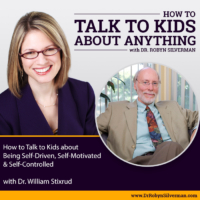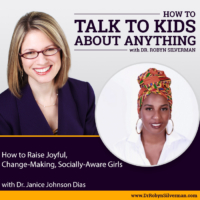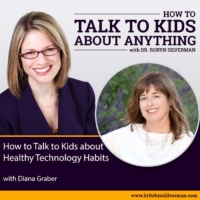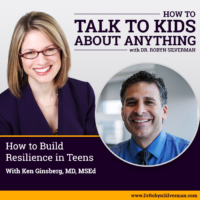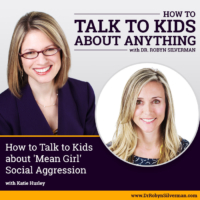Podcast: Play in new window | Download
Subscribe: Apple Podcasts | RSS | More
How to Talk With Kids to Build Motivation, Stress Tolerance & a Happy Home
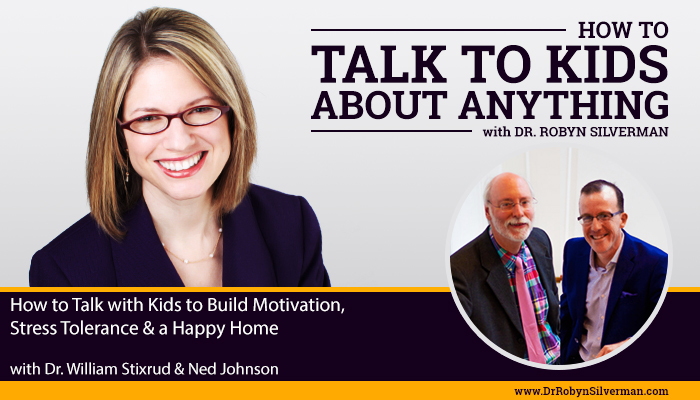
This episode of How to Talk to Kids about Anything focuses on effective communication tools that parents can use to best reach their children as they enter middle school and the teen years. How do we engage in respectful and effective dialogue, give constructive feedback, problem-solve and provide boundaries and still navigate the complex terrain of teenhood? Dr. Robyn Silverman interviews William Stixrud and Ned Johnson in this lively and fascinating exchange.
Dr. William Stixrud and Ned Johnson. This episode of How to Talk to Kids about Anything focuses on effective communication tools that parents can use to best reach their children as they enter middle school and the teen years. How do we engage in respectful and effective dialogue, give constructive feedback, problem-solve and provide boundaries and still navigate the complex terrain of teenhood? Dr. Robyn Silverman interviews William Stixrud and Ned Johnson in this lively and fascinating exchange.
While I’m busily working on my book, How to Talk to Kids about Anything, based, in part on this podcast and the hundreds of parenting books we’ve discussed together, it’s awesome that we get so many great quotable guests that I literally get to quote in that chapters of my book! I’m currently writing the chapter about talking to kids about friendship and bullying while editing another on big feelings. Today’s guests will surely be quoted as they have done amazing work in the area of parent-teen conversations around technology, sleep, anxiety about current events, consequences and family problem-solving. How many parents have been left wondering, after having a conversation with their teen, what just happened? Why did they shut me out? Why did that go so badly? What should I do or say next? We are going to find out some answers from Bill Stixrud and Ned Johnson today.
Ned Johnson is a motivational coach who runs an elite tutoring service and William Stixrud, PhD, is a a clinical neuropsychologist, who we had on the podcast previously as they talked about their best-selling book The Self-Driven Child. They are two of the top go-to voices on parenting in the media. Stixrud and Johnson have more than 60 years combined experience talking to kids and we are so excited to have them both on the show today so welcome Bill and Ned today!
Important Messages:
- Cultivating a strong relationship with parents is close to a silver bullet for protecting kids from serious mental health problems.
- How do we stay connected? Empathy. Tell them we understand them and cultivate the relationship.
- What are teens looking for? Who are they closest to? Someone who listens when I talk and who doesn’t judge me- someone who doesn’t tell me what to do.
- How do they know if you listening? Active listening. Reflective listening. 1960s technique. Trying to understand. Am I getting this right?
- WIG- What I got is… Great system to showing you understand and want to understand what you are hearing. Ron Miggen—wigging. Sometimes when kids bring us problems, the first thing out of our mouths isn’t always as effective as we want to be- we might be dismissive, tongue tied or jump into problem-solving. Gives us time- count to 10 in our heads. “I got into a fight with Jenny and I called her this terrible name and now nobody will talk to me” and we might jump in to problem-solve- mode or blame mode (apologize? Why did you say that?) instead of seeking to understand and show that you understand. “So let me get this straight- you were on social media and…” Want to make sure you have shown that you get them- works with everyone. Single most important way to calm hard emotions and make sure someone feels heard.
- Don’t nag, lecture and remind- can’t talk a child into something. Don’t believe in this. Talk about it. Resisting because it’s often in their best interest. “I don’t want to talk you in to anything. You are smart enough to make the call. I’d like to make an informed decision- knowing that I don’t want anyone to force you to do this.” Take force off the table. Share point of view. “It makes sense to try to take the medicine and see if it helps you- it’s like turning on a light switch—if it doesn’t help you or even if it does and you decide not to take it- you don’t have to take it.” Let kids know “I know I can’t make you do this” it’s a reality. Much more likely to get kids to come along with this. (1) In this case, medicine could have helped his bio-chemistry but also (2) taking force off the table could have changed the energy because the kid wasn’t invested in his own failure.
- Changing the energy. Not forcing, not nagging, not rescuing. Righting reflect (psychologists talk about this). Want to fix it. This is a problem and a missed opportunity.
- One of the best ways to show someone we care is to not try to talk someone out of their feelings but to sit with them when their feelings are hard.
- Don’t try to talk out of feelings. It’s not approving of their behavior. It’s not problem-solving. Just reflecting “that sounds like a hard day.” Example; Not “don’t get all wound up about it instead “wow, you sound really upset.” Not “you should apologize” but rather “that seems like a really hard day.” Not “I don’t think you should have done that” but just holding space. They then figure out “maybe I should apologize.” And you can say; “that seems like a good idea.” And they might say; “maybe she was just having a bad day” and you can say; “that’s a helpful way to look at this.” (They take the lead in detecting, dissecting and solving the problem). Cue our kids but not solve for them- we want them to go out into the world and solve their own problems. Go out into the world with the skills that we’ve nurtured often just by being nurturing and validating.
- Accommodations: How do I motivate my kid? How do I get my kid to change? To want what he doesn’t want? Motivational interviewing. Yale: Treating anxiety SPACE. Wired to soothe and protect. Make accommodations- worried about taking the bus- we reaasure. Common accommodations. More we accommodate, more anxious kids get. Are we doing this for the anxious kid and not someone else? “I thought you couldn’t handle this anxiety and I thought I needed to change in these way but I realize now that I was selling you short. I don’t need to do this. You can handle this. I’m 100% confident.” Chronically doing things for kids that they can do themselves is the problem.
- Make deposits into the emotional and relationship bank accounts- accommodations shows care BUT also disrespectful- you can’t handle this without me. Normalize feelings. You don’t have courage without fear.
- Resilience- return to a previous state or shape. How well or quickly do I return to my previous state or shape? Bent out of shape and bounce back? Are we the walking baby blanket- we want kids to say to themselves; “I know this is hard but I know I can do it.”
- Strengths in our children: Internal and external locus of control. Is it dependent on what others think of me? Comic strip: A child shows her art to parents- “is this my best work?” Instead- “I noticed you took some great time with drawing the hands this time- tell me about that.” Acknowledge. Subtle. “I noticed you let that child go in front of you. That was a really kind thing to do.” Don’t need constant validation.
- Carol Dweck- mindset. Praise for effort. But also, kids need to know their strengths. Here some kids you can do better than most kids.
- Bill: “I hope I find things that you suck at- because most successful people are good at some things and suck at other things. You make a living at the things you good at doing.”
- The kids that aren’t great at school/sports: “What do you love to do?” “You’ll probably make a living from interacting with other people in a skilled way.” (teaching, counseling…). “I want you to work hard in school because the jobs related to talking to people for a living need a college degree and often a master’s degree. I want you to work hard.” “Carol Dweck says don’t tell kids they’re smart. But what I say is tell them they are “smart enough.” You are smart enough to do what you want to do. Antidote to perfectionism. You don’t have to be the smartest kid in the class—you have to be smart enough.
- When testing kids, Bill will write out the things that the child is good at, according to the testing- write them out by hand. Personal qualities. What helps them to be successful? Write out how they can serve the world with that strength. “When something is challenging for you, you work your butt off.”
- Offhand comments can make a huge impact. Make an effort on phone or with others- and had a sense that child was in ear shot- take great care of how to talk about them. “Remarkable how my child…” “It’s amazing that he notices things that others don’t” “He has trouble with X but I don’t think that’s going to hold them back. If they have a sense that we don’t know they are listening- then it must be true. Overhearing can be powerful. Top of the stairs listening.
- Watch it! When you are talking negatively about others- like about your parents and how they are driving you nuts and then don’t say it to their faces- the child might glean that you could be doing this about them too. Cognitive dissonance. Does she think I’m a bum when she tells me I’m terrific?
- Compliments: “He is a natural psychologist.”
- Technology: Try to understand. “What do you love about this game? I see that you can connect with your friends and you seem really confident while playing it…” Want to understand. Validate. (Honest- when you were young, you probably would want to do this too!). How many of you think you are on screens too much? Everyone raises their hands. It’s not lost on them. If we keep pushing “less, less, less” they will argue the other side with “more, more, more.”
- Technology: Start with trying understand why it’s meaningful. Not monolythic. How they connect with friends. How explore interests. Creative ways. On for a thousand different things. What does it mean? Competence- because they feel confident playing video games but not in sports. Connection- found friends online- where trouble finding them in real life. Escape? What is the reason? Understand why before starting to judge it.
- Motivational interviewing- used with alcoholics. Pushed back when judged.
- Are there needs not being met? What tech crowding out? Face to face, sleep, etc.
- One glass of wine ok- but too much, downside.
- It’s not our job to regulate technology but for kids to learn to regulate their own use of technology.
- Psychiatrists help people in silicon valley to make video games as addictive as possible.
- Fortnite- Ned’s son. Used it all day. Didn’t say anything. Sunday night realizes- 6 hours of homework. Could spike it- I told you so. But- there’s this book (and this podcast!!). Empathy- “wow, that sucks.” “Can I ask you a question? Do you know how much time you spent on Fortnite- was it fun? How much time could you have spent on Fortnite and still gotten your fix? “Would it help you in the future if Mom or I helped you regulate your use of technology?” Now have buy in. Speak respectfully. We all have concerns. Heading off to college in 2 years- can’t regulate use of technology from college! Let them struggle with our help. Good luck sending them to college if you are the one regulating the technology because if that’s the case- they’ll go to college and fail out in 6 weeks.
- *Parents might think; “I will step back when he steps up.” But that’s not how it works. Never works that way. When you step back and create the void, then they step up. I’ve never seen it work the other way. “The beatings shall continue when morale improves.”
- Negotiate. I can’t live with myself knowing that mood goes south after being on social media. We need to find a way for you to use this so that you are satisfied but I can live with it. Collaborative problem solving.
- Get in elite colleges BUT they can’t handle it emotionally. Need the experience running their own lives.
- You can’t change someone else. They need to want to change.
- Kids feel when we are frustrated with them- and then they can’t take in our wisdom.
- Remember- the relationship we have with our kids as adults should be decades longer than the relationship we have with our kids when they are children.
- Show respect—it makes a difference. Seeds of sharing as an adult are planted as children. Want to have close loving relationships with our kids. It’s not about homework- seeds of conversation. What they’ve learned through conversations and through experience and apply it to their lives.
Notable Quotables:
- “Helping teenagers and the way that they think is really cool.” – NJ
- As close to a silver bullet as you can get to protecting kids from serious mental health problems is having a close relationship with parents.” -WS
- “Reflective listening buys us time and also gives us ‘buy in’ before we start to give advice.” -NJ
- “Take force off the table so you can share your point of view.” -WS
- “If someone we love is really distressed, it’s distressing to us. We want to get rid of their distress to help them- and to also help ourselves. We jump into start solving things or talk them out of their big feelings. It’s both a problem and a missed opportunity. It’s a problem because it can give kids the message that someone else, other than them, are in charge of solving their problems or my Mom or Dad don’t want to know about these hard problems. The missed opportunity is that we want our kids to have the experience with our help to solve their own problems…and shift their perspective.” -NJ
- “One of the ways we get close to people is hanging with them when their feelings are hard and not immediately trying to solve it or talk them out of it.” – NJ
- “We can cue our kids but in a perfect world, we don’t do thinking for them that they can do themselves because we want them to be able to go out in real life with these skills that we’ve nurtured, often times, just by our energy of being empathetic and validating.” -NJ
- The more we accommodate, the more anxious kids get.” -WS
- “Acknowledge what is true about your child so that they carry that within them and they don’t need someone to constantly validate them and tell them that this is their best work.” -NJ
- “We need to tell the kids that that they don’t need to be the smartest kid in the class- they just have to be ‘smart enough’ to do what they want in life. Tell them that they are smart enough.” -WS
- “It’s so good for kids to work hard and get better and better and better at something that is important to them.” ~WS
- “Our job as parents is not to regulate our kids use of technology but to help them to learn to regulate their own use of technology.” ~NJ
- “We want kids to be able to run their own lives before they leave for college or leave home to do something else.” -WS
- “If you think you can change your kid, think differently. We can’t change somebody else unless they are asking for help to change.” -WS
- “So much of being effective in our communication is not the ‘what’ but the ‘how.” -NJ
- “The relationship we have with our kids as adults should be decades longer than the relationship we have with our kids when they are children.”
Resources:
TheSelfDrivenChild.com
Book What Do You Say?: How to Talk with Kids to Build Motivation, Stress Tolerance, and a Happy Home https://www.amazon.com/What-You-Say-Motivation-Tolerance/dp/1984880365


